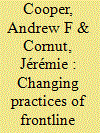| Srl | Item |
| 1 |
ID:
164980


|
|
|
|
|
| Summary/Abstract |
This article develops the concept of ‘frontline diplomacy’ – what practitioners referring to work in embassies, consulates, and permanent representation as ‘the field’ –, defined here as all diplomats’ activities taking place away from headquarters. IR scholarship tends to focus on Ministries of Foreign Affairs located in capitals. On the contrary, building on the practice turn in IR, we first show that international politics emerge from frontline practices. Adding to criticism against the practice turn, we then explain that it has missed important transformations occurring in frontline diplomacy because it tends to privilege stability over change. We finally discuss two innovations in frontline practices: the action of Sherpas in G20 summits following the 2008 crisis and the use of Twitter by US Ambassador to Russia Michael McFaul (2012–14). For each we answer three questions: How do these activities transform traditional modes of operation? How are non-state actors involved in them? What do they tell about transformation of global politics? Because diplomatic practices at the frontlines epitomise international politics, these new directions for inquiry contribute substantively to IR scholarship. At the theoretical level, they enrich the continuing encounter between IR and diplomatic studies through practice theory and help to understand change in practice.
|
|
|
|
|
|
|
|
|
|
|
|
|
|
|
|
| 2 |
ID:
170280


|
|
|
|
|
| Summary/Abstract |
Applying a Bourdieusian feminist practice theory approach to the study of norm implementation, this article introduces a fourth level of analysis, the embodied subject who is expected to be governed by peacekeeping norms. It does so by examining the training experiences of Rwandan tactical-level female military peacekeepers deployed in mix-gender contingents to UNAMID. It is argued that the pre-deployment training space is a field of norm contestation and negotiation, wherein gendered peacekeeper subject positions and gendered peacekeeping labouring practices are constructed and performed. The research findings suggest that by partially complying with the UN’s gender mainstreaming norms, the Rwanda Defence Force strengthens the military’s gender protection norms and establishes the sexual division of labour of the mission area. Trained to perform a scripted Rwandan female subject position, some women find they are not adequately prepared for the more challenging situations they find themselves in when working in multi-dimensional peacekeeping operations and devise alternative, informal training practices to better equip themselves prior to deployment. The case study draws on 65 depth-interviews with Rwandan military personnel, trainers and external consultants and non-participatory observations of field exercises.
|
|
|
|
|
|
|
|
|
|
|
|
|
|
|
|
| 3 |
ID:
161272


|
|
|
|
|
| Summary/Abstract |
This article develops an International Practice Theory (IPT) approach to United Nations peace operations through the study of the UN Stabilization Mission in Haiti (MINUSTAH). MINUSTAH saw the introduction of new practices within the context of a UN peace operation, namely the use of joint military-police forces to conduct offensive action against armed groups that were labelled as ‘gangs’. While more objectivist problem-solving approaches would argue that the UN mission was simply adapting to the situation on the ground, an IPT lens reveals that there was considerable struggle to integrate these new practices within the repertoire of peacekeeping. The article argues for the benefits of applying an IPT lens to peace operations while proposing to develop theoretical and methodological approaches that have been less prominent in IPT. Theoretically, it posits that IPT can better articulate practice and discourse by paying more attention to what actors say about what they do.
|
|
|
|
|
|
|
|
|
|
|
|
|
|
|
|